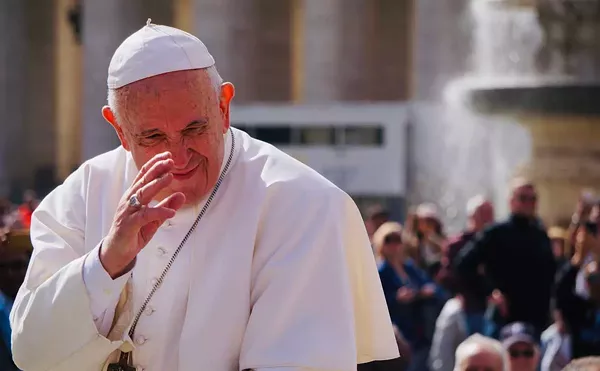
Audio By Carbonatix
[
{
"name": "GPT - Leaderboard - Inline - Content",
"component": "35519556",
"insertPoint": "5th",
"startingPoint": "3",
"requiredCountToDisplay": "3",
"maxInsertions": 100,
"adList": [
{
"adPreset": "LeaderboardInline"
}
]
}
]
Ostensibly a movie about a tragic historic event, Pearl Harbor is really just the latest gargantuan action flick from the team of director Michael Bay and producer Jerry Bruckheimer (The Rock, Armageddon), chockfull of their trademark shorthand characters, dramatic clichés, superhuman derring-do and multiple climaxes. Of course, one had no right to expect much more, even if there was always the chance that the dynamic duo might have been sobered a bit by the grim reality of their central subject. And one does sense the movie straining toward epic significance as its three-hour story arc (supplied by Braveheart screenwriter Randall Wallace) follows its hero from heartland innocence to battle-worn maturity. But there’s a hollowness to the proceedings and every attempt to tug at our heartstrings or provoke our pride or outrage is dead on arrival.
The problem here is that while in terms of purely technical achievement the movie is as modern as this morning, dramatically it’s retarded. The dialog alternates between the banal and the risible. You can distinguish between the real hero and the runner-up hero (who is doomed) because the real hero has a larger jaw. The comic relief stutters. Real-life personages including FDR and Col. James H. Doolittle speak like pontificating robots. If something presumably serious is going on, the strings begin to swell inanely, a mudslide spiked with saccharine.
None of this is helped by the fact that Bay seems temperamentally incapable of holding a shot for much more than five seconds. He favors the kind of fractured mise-en-scène which might well suit a more experimental kind of storytelling but which, when layered over this creaky narrative, just adds to the feeling of emotional disconnect.
Bay’s restless style is especially inappropriate during the film’s first 90 minutes, when we’re asked to be drawn into the lives of Rafe McCawley (Ben Affleck), his lifelong pal Danny (Josh Harnett) and Rafe’s true love Evelyn (Kate Beckinsale). But since the characters are ciphers, we’re left admiring the retro sets (Bay can shoot a pretty picture) and waiting for the war to begin.
And when it does, with its 40-minute titular set piece, it’s impressive in all the wrong ways, the banking planes and exploding metal looking really, really cool. But little feeling is evoked since, as everybody knows, when there’s mass slaughter in an action flick, the only people who die are bad guys and extras.
Following this state-of-the-art set piece there’s an anticlimactic hour or so during which we learn that Doolittle’s famous raid on Tokyo was God’s way of determining whether Affleck or Harnett should end up with Beckinsale.
The acting ranges from competent to god-awful, the latter epitomized by Alec Baldwin’s Doolittle and Jon Voight’s FDR. Voight, hampered by a really bad make-up job which makes him look more like Walter Mondale than Roosevelt, at least has the movie’s one moment of high camp, as he hoists himself up from his wheelchair, Strangelove-style, in a demonstration of good old unbeatable American moxie. Whatta guy.
Visit the official Pearl Harbor Web site at www.pearlharbor.com.
Richard C. Walls writes about the arts for the Metro Times. E-mail him at letters@metrotimes.com.





